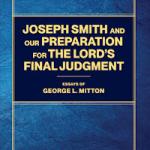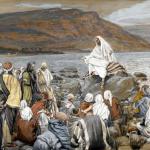 We continue with our series: “How I Do Research.” I am very pleased to present to you the interview I conducted with Prof. Helen Bond of the Univ. of Edinburgh. Prof. Bond has numerous important books including Pontius Pilate in History and Interpretation (SNTSMS, 1998), Caiaphas: Friend of Rome and Judge of Jesus? (2004), and she has written dozens of academic essays.
We continue with our series: “How I Do Research.” I am very pleased to present to you the interview I conducted with Prof. Helen Bond of the Univ. of Edinburgh. Prof. Bond has numerous important books including Pontius Pilate in History and Interpretation (SNTSMS, 1998), Caiaphas: Friend of Rome and Judge of Jesus? (2004), and she has written dozens of academic essays.
How do you approach research as a whole? Do you have a big-picture strategy? Do your research all at once, and then write? Do you do some sketching and reflecting on paper and then dig into research? Do you go back and forth?
I have a variety of approaches, depending on the project. If I’m asked to write a chapter on a specific topic (say for a collection of some kind), I’d probably do all my reading first, gradually outlining a plan in my head. Then, at some point (usually close to the deadline!), I’d write it all up within the given word length. I might still need to do some fine-tuning and checking of sources, but the writing would very much take priority.
If it’s a topic I’m working out for myself, I’ll handle things quite differently. One of the exciting things about research is that you don’t always know at the start what it is you want to find out, especially in a book-length project. I often start off with a hunch that there might be something worth investigating down a particular avenue, but I’m not always too clear on what it might be. Ideally, I’d spend my time in a combination of reading and writing. I always find that writing helps me to clarify my ideas, so even if a piece of prose doesn’t ever end up seeing the light of day, it’s still been a useful exercise. I like to do preliminary surveys of everything that might be relevant early on, just to see the lie of the land (I think of these as archaeological ‘trial trenches’). Then I start to put things together and hope that an overall argument starts to emerge. At some point I think it’s good to frame the topic as a question, or a series of inter-related questions; hopefully structuring a coherent answer to the questions will give the whole book a clear argument.
One of my present difficulties is that I get so little time for research. This means that I have to be much more diligent about writing things down and keeping notes – otherwise I forget all my best ideas. When I’m writing a chapter, I really do need a lengthy period of time without other distractions, so during term-time I just have to wait until we have a break from teaching. It can be frustrating sometimes, but I’ve found that if I try to write when all I can do is snatch an afternoon here and there, it’s really a waste of time.
- What kind of notes do you take (ideas, quotes, etc.)? How do you organize them?
Well, I’m hoping I may get some good ideas from other people here. I think I take too many notes, especially at the start of a project. I’ll note down what the author is wanting to do, how s/he goes about it, and the conclusions. I’ll also commonly note down references to primary sources and secondary literature. I try not to take things down verbatim, though I do sometimes end up with lengthy quotations.
Nowadays I type up my notes and keep them on my laptop. As I noted above, my time is very limited, so I try to do some reading during semester and have everything ready so that I can read the typed-up notes as soon as I get some time to write. I find now that I type much faster than my handwriting, and having material electronically means I can search it easier. I still print everything out, though, and put the pages in a folder for the appropriate chapter.
- What kind of tools do you use for researching and collecting information? (software? Do you store notes in Endnote? Dropbox? Evernote? Filing cabinet?)
None of the above! I still prefer to write with a pen and paper if possible. The advantage of the ‘pen method’ is that you only start to write once you have a fairly clear idea of what you want to say (who wants to write things out more than they have to?!). So it may seem archaic, but once I’ve got a bit of time, and my notes spread out in front of me, I like to make a plan and to see how it works as I start to write. At some point I’ll type it all up, print it out, and go through it again with a pen in my hand, swapping bits around, cutting out chunks, or noting where I need to add extra material. Then the process of reading, note-taking and eventually writing all starts again . . .
I like the writing stage. I’m an avid reader (especially of nineteenth century novels), and there’s nothing I like better than working my way through a paper, trying to beautify my prose. Style is as important to me as content – if you can’t communicate clearly, there’s not much point in setting things down in the first place.
- What have you learned about doing research, collecting notes, and the process of writing throughout your career – put another way, if you could get into a time machine and go back twenty years (or ten years), what advice would you want to give to your younger self about the process of research and how you take notes and read scholarship?
I’m not sure that I really do anything all that differently now compared to when I was working on my PhD. If I could talk to the younger me, I’d make her realise that never again would she have so much time for research, and make sure that she didn’t fritter it away. One area where I have learnt a little (though not as much as I should) is in keeping bibliographic references. I’m always so keen to start reading a book and jotting down notes that I’m often very bad at recording the author, title, publisher etc. I try to discipline myself now, and to make sure that I get all those details in my bibliography before the book goes back to the library. But my old self was extremely bad at this. I would have pages of notes with only the author’s name on them, and little else to go on. My worst case was when I came back from spending a year in Tuebingen; I was working on a chapter on Roman coinage and had a page of notes entitled only ‘Blue Book’. I could remember the book well, even where it was in the library, but I had nothing else to go on. Luckily a friend managed to track it down for me! The wasted hours taught me to be at least a little better in the future.
Of course, if I really did have a time machine, I wouldn’t waste time visiting my old self – I’d be straight back to the first century to see what Jesus was really like . . .











